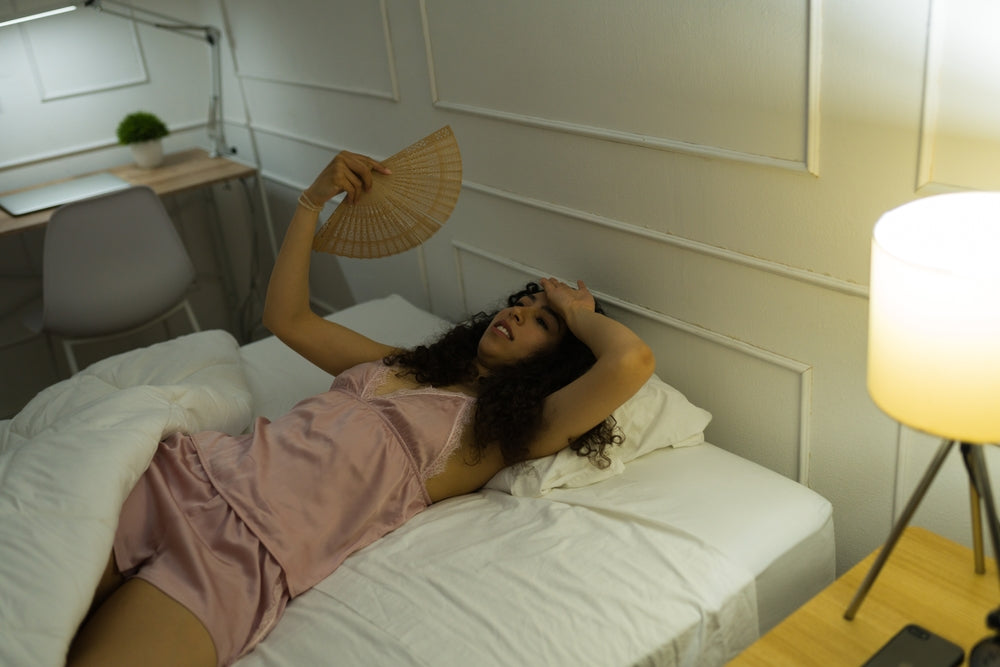Free U.S. Shipping On Orders Over $150

How to Sleep Well When It Is Hot and Humid
Posted on
Humid heat is a completely different animal from dry heat. As we explained in a recent post on moist vs. dry heat, hot and humid weather is more uncomfortable and dangerous compared to hot and dry weather.
Humid heat can also make sleeping a lot more difficult especially if you are already a hot sleeper or you often get night sweats. In this post, we have some tips on how to sleep well when it is hot and humid.
Why Does Humid Heat Feel So Uncomfortable?
The problem with hot and humid weather is that it makes it so darn difficult for your body to cool down.
One of the main ways your body cools itself is by sweating. As the sweat evaporates off your skin, it takes some body heat away with it.
But evaporation of sweat depends on how much moisture there is in the air, or what we call humidity. High humidity slows down evaporation, meaning sweat stays on your skin and you don't get cool. So you end up hot, sweaty and just plain miserable.
Humid heat can feel particularly uncomfortable at night. Because the sweat doesn't have anywhere to go, your sheets and pillow get damp and your skin feels clammy. On top of that, you still feel hot and your body tries to deal with it by sweating some more.
Hot and humid nights can mess up with your sleep, leading to insomnia and serious sleep deprivation.
5 Tips to Sleep Well When It’s Hot and Humid
1. Get a Portable Dehumidifier
Even a small bedside dehumidifier can make a big difference in the humidity level. Or get a larger floor unit that can suck more moisture out of the air.
A dehumidifier doesn't lower the temperature, but you’ll find that it makes you feel cooler. That’s because, by lowering humidity, sweat can easily evaporate off your skin. So sometimes just using a dehumidifier is enough to make your bedroom comfortable enough for sleep.
But if it’s quite hot, you can turn on the AC to help you get cooler faster.
2. Turn on the Fan
A fan is one of the cheapest ways to deal with hot and humid nights. A fan doesn't actually lower room temperature, it only improves air circulation. But this can be surprisingly effective in making you more comfortable.
Circulating air does two things. One, it prevents heat from building up around your bed and making you hotter. Two, it improves sweat evaporation from your skin, which helps you feel cooler.
There are many different kinds of fans you can use including a ceiling fan, a pedestal fan or a bedside fan. Just make sure that whatever you get generates powerful airflow and it’s not noisy.
3. Use Breathable and Moisture-wicking Bedding
To ensure you don't wake up in a damp mess, get bedding that’s breathable and moisture-wicking. This includes the sheets, duvet and pillowcase.
Breathable bedding allows air to easily flow through and carry away excess heat and moisture. Bedding made from natural fibers like cotton, wool, bamboo and linen are the most breathable.
Moisture-wicking means the bedding is able to move sweat from your skin and let it evaporate into the air. Again, natural fibers offer the best moisture-wicking performance.
But be careful about cotton bedding if it’s very humid or you sweat a lot at night. Cotton is moisture-absorbing, not moisture-wicking (here is an explanation of the difference between moisture wicking vs. absorbing).
Instead, go for materials like bamboo, linen and wool.
4. Hydrate
When it’s hot and humid, you sweat a lot more, meaning your body is losing more water. Dehydration can affect your sleep quality as well as your body’s ability to stay cool.
So stay hydrated through the night.
5. Sleep Naked
Clothes can act as an additional barrier to keep sweat trapped against your skin. Either switch to light sleepwear or sleep fully naked. It will help keep your core temperature down, and allow your sheets to wick away sweat more effectively.
Final Thoughts
Remember to wash your bedding more frequently when it’s hot and humid. You are sweating more, meaning your sheets and pillowcase are getting dirtier faster. They stink more quickly and all that sweat can also attract bacteria and mold. Unhygienic bedding also increases your risk of acne and other skin problems.
Change your bedsheets, pillowcase and duvet cover at least twice a week. Alternatively get our antibacterial Jax sheets and pillowcase. They stay cleaner, more hygienic and fresher for longer.
Quick links
Contact
6063 Hudson Road #160
Woodbury, MN 55125
Yo@hercLeon.com
Leave a comment: